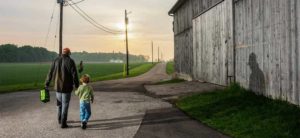Robert Moore, Attorney
Hunting season is quickly approaching, which means landowners will be approached by hunters asking permission to hunt on the property. Liability for hunters, visitors and trespassers is always a concern for landowners. The following is a summary of the premise liability laws in Ohio.
Ohio law deals with premises liability by first creating categories to the different types of visitors to the property and then applying different standards of law depending on the category. Landowners understandably are worried about liability for visitors to their property, but Ohio law actually provides significant protection for landowners.
Trespassers
There are two types of trespassers – known and unknown. Property owners owe no duty of care to unknown trespassers other than to not intentionally cause harm to them. Essentially, landowners have no liability for unknown trespassers. Once a trespasser is discovered or known, the property owner is required to warn the trespasser of any known dangers. Consider the following example:
1. Unknown to Farmer, Trespasser is walking through Farmer’s field. Trespasser falls in a large hole created by a tile blowout that the farmer intended to fix tomorrow. Farmer likely has no liability for Trespasser’s injuries.
2. Farmer sees Trespasser walking towards the blowout hole. Farmer has a duty to warn Trespasser that he is headed towards a dangerous condition. Provided Farmer provides the warning, he is not liable for Trespasser being injured on the property. Farmer should then demand Trespasser leave the premises immediately and call the Sherriff if Trespasser does not leave immediately.
Under no circumstances should traps be set for trespassers, the law will almost always place a person’s physical wellbeing above protecting property. The classic example is the landowner who can never catch the trespasser riding his ATV across his property. In frustration, the landowner stretches a wire across the ATV path and the rider is injured when he rides into the wire. In this scenario, the landowner will almost assuredly be liable for the rider’s injuries.
A few years ago, Ohio adopted a different standard for trespassing children. In some cases, a landowner can be liable for children who trespass on the property. However, the landowner must know the child is trespassing, there must be an artificial condition that can injure the child, and the artificial condition can be remedied relatively easily. These are difficult conditions to be satisfied but it is possible for a landowner to be liable for a child trespasser.
Licensees
Ohio law considers a licensee to be someone who comes onto the landowner’s property for his own benefit, not the landowner’s benefit. The classic example of a licensee is someone who asks to cut firewood and does not pay the landowner. A licensee is similar to a known trespasser in that the landowner is only required to inform the visitor of any known dangers and refrain from intentionally harming the visitor. The landowner is not required to actively inspect the property to be sure it is free from dangers that can injure the visitor.
Invitees
This class of visitors is invited onto the property for the landowner’s benefit. An example of an invitee is a farm market inviting guests onto the property to buy produce. The landowner has a duty to inspect and repair any dangerous conditions or to warn and keep guests away from any dangerous conditions that cannot be remedied. Obviously this is the highest degree of liability. Landowners who often have invitees should be sure that their liability insurance policy covers these guests and should have a fairly high liability limit.
Hunters
Hunters are in a special category called recreational user. Ohio law creates immunity for the landowner from injuries sustained by a recreational user. The definition of recreation use is “to hunt, fish, trap, camp, hike, or swim, or to operate a snowmobile, all-purpose vehicle, or four-wheel drive motor vehicle, or to engage in other recreational pursuits.” Landowners can be compensated for the use of their land and still maintain the liability immunity. The Recreational User Statute provides significant liability protection to landowners who allow hunters, fishermen, and other users onto their property for recreation purposes. The law was enacted to encourage landowners to open up their lands for use by others.
Even though Ohio law provides protection to landowners for visitors, it is still absolutely critical to have sufficient liability insurance, as this is always the best liability management strategy. A phone call to your insurance agent is time well spent to be sure that the policy provides adequate protection for your family, farm, and visitors.




